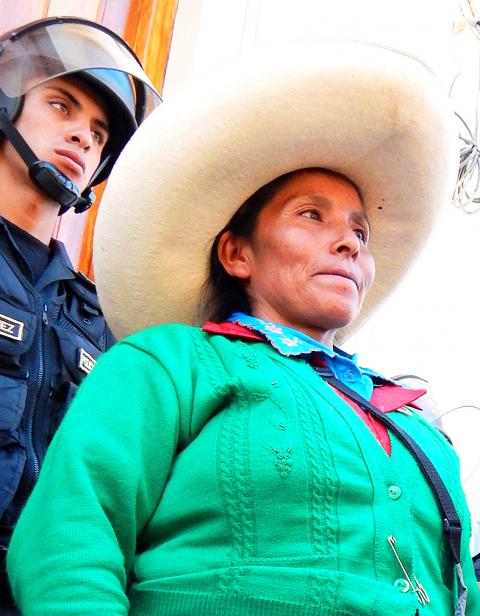With her straw hat and peasant dress, Maxima Acuna de Chaupe does not look like the type to take on a global mining giant, but as she gazes out from her small house in the Peruvian highlands, she is adamant: This is her land.
Maxima lives with her husband, four children and their spouses on a small farm that sits on the land where Yanacocha, a subsidiary of US mining giant Newmont, wants to expand South America’s largest open-pit gold mine.
The firm is facing widespread opposition to the US$4.8 billion gold and copper mining project from the local community and the regional government of Cajamarca in northern Peru, which says the mine expansion will put the water supply at risk.

Photo: AFP
Maxima, 48, has become the face of that resistance.
For four years, the illiterate peasant farmer has been fighting the mining company in a court battle that took a dramatic turn last week when she tried to build an addition on her house and Yanacocha tore it down.
“I can show that we have owned this land since 1994. All my papers are in order,” Maxima told reporters. “What counts here are documents.”
“Let them show their documents. If they are the owners, let them present the bill of sale, the document with my signature that says I sold this land,” said Maxima, an indigenous woman with a chiseled face who wears bright traditional clothing and the wide-brimmed straw hat that is customary in the region.
Maxima’s farm is a 25 hectare plot at an altitude of nearly 4,000m in the hamlet of Tragadeogrande.
Yanacocha says it bought the land in 1996 from the local department of Sorochuco.
It pressed charges against her for invasion of property, but Maxima was acquitted.
Her lawyer, Mirtha Vasquez of environmental defense group Grufides, says the matter should have ended there.
However, when the family tried to expand their small house, Yanacocha workers demolished the cement addition, with the help of the police, Maxima said.
“They want to make me leave by force. They see that I’m poor, that I do not know how to read and they think I can not stand up for my rights,” she said by telephone. “However, I have my documents. I’ve got no reason to be humiliated or afraid.”
With her lawyer’s help, Maxima has now brought charges of her own against Yanacocha for invasion of property.
Since 2011, the mining company has had to suspend prospecting in the region over concerns about the environmental impact of its plans to drain the area’s high-altitude lagoons and replace them with artificial reservoirs.
Those plans have only strengthened Maxima’s resolve.
“My land borders Yanacocha. It has springs ... which we drink from. If I sell it, what water am I going to drink? What will we live off of?” she said.
She accuses the mining firm of blocking the access roads to her land and preventing her family from going out for food.
However, she is not intimidated.
“My family has suffered for defending this land, but I just want to leave my children a place where they can live,” she said.
Her fight has brought new attention to the conflicts between Peru’s indigenous communities and mining companies that extract the country’s natural resources, its main source of wealth.
According to the Peruvian government mediator for such cases, 140 environmental conflicts were registered last month alone.
Two weeks ago, a 25-year-old villager died in clashes between police and protesters fighting oil company operations in the Amazon.
The protest in the central village of Pichanaki came on the second day of a strike targeting oil operations that local people fear will contaminate rivers and soil.
After the clashes, which also left 20 people wounded, the government ordered the oil company, Argentine firm Pluspetrol, to withdraw from the area.
However, such disputes present a dilemma for the government, which is keen to revive mining investment after it fell more than 10 percent last year — a drop that mining firms blame on environmental regulations delaying their projects.

A new online voting system aimed at boosting turnout among the Philippines’ millions of overseas workers ahead of Monday’s mid-term elections has been marked by confusion and fears of disenfranchisement. Thousands of overseas Filipino workers have already cast their ballots in the race dominated by a bitter feud between President Ferdinand Marcos Jr and his impeached vice president, Sara Duterte. While official turnout figures are not yet publicly available, data from the Philippine Commission on Elections (COMELEC) showed that at least 134,000 of the 1.22 million registered overseas voters have signed up for the new online system, which opened on April 13. However,

ALLIES: Calling Putin his ‘old friend,’ Xi said Beijing stood alongside Russia ‘in the face of the international counter-current of unilateralism and hegemonic bullying’ Chinese President Xi Jinping (習近平) yesterday was in Moscow for a state visit ahead of the Kremlin’s grand Victory Day celebrations, as Ukraine accused Russia’s army of launching air strikes just hours into a supposed truce. More than 20 foreign leaders were in Russia to attend a vast military parade today marking 80 years since the defeat of Nazi Germany in World War II, taking place three years into Russia’s offensive in Ukraine. Putin ordered troops into Ukraine in February 2022 and has marshaled the memory of Soviet victory against Nazi Germany to justify his campaign and rally society behind the offensive,

CONFLICTING REPORTS: Beijing said it was ‘not familiar with the matter’ when asked if Chinese jets were used in the conflict, after Pakistan’s foreign minister said they were The Pakistan Army yesterday said it shot down 25 Indian drones, a day after the worst violence between the nuclear-armed rivals in two decades. Pakistani Prime Minister Shehbaz Sharif vowed to retaliate after India launched deadly missile strikes on Wednesday morning, escalating days of gunfire along their border. At least 45 deaths were reported from both sides following Wednesday’s violence, including children. Pakistan’s military said in a statement yesterday that it had “so far shot down 25 Israeli-made Harop drones” at multiple location across the country. “Last night, India showed another act of aggression by sending drones to multiple locations,” Pakistan military spokesman Ahmed

US President Donald Trump on Wednesday said that he would make a decision about how the US government would refer to the body of water commonly known as the Persian Gulf when he visits Arab states next week. Trump told reporters at the White House that he expects his hosts in Saudi Arabia, Qatar and the United Arab Emirates will ask him about the US officially calling the waterway the Arabian Gulf or Gulf of Arabia. “They’re going to ask me about that when I get there, and I’ll have to make a decision,” Trump said. “I don’t want to hurt anybody’s